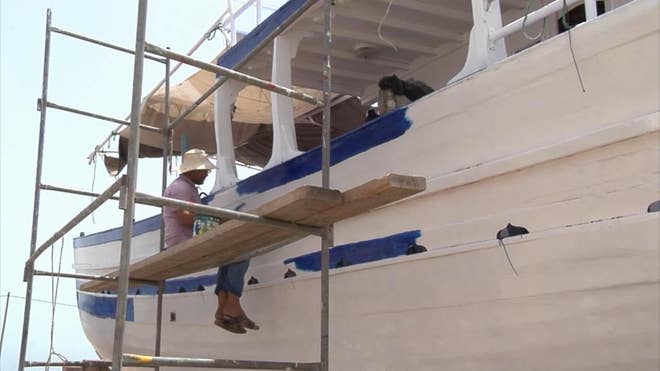The Desperation of Fleeing Migrants
"Today I have the means to bring back 107 people, but I'll lose 3,000 Tunisian dinars ($1,922)." Tomorrow I might not be able to. I have people who work with me. If I interrupt work once, twice, three times, it becomes a heavy burden on my shoulders."
"The other day, with my boat, I brought back 107 people, three or four died before my eyes; they fell in the water and they didn't know how to swim. My stability (of the boat) didn't allow me to act. One hundred and seven people represents a great danger for my crew."
Chamseddine Bourassine, Tunisian fisherman, Zarzis, Tunisia
"We find them dead, but we don't declare it. [If] there is a body on the water and we are six or seven hours from the land, we can't get them on board."
Mansour Ben Chouikha, Tunisian fisherman
-
 In this image taken from TV Tunisian fisherman Chamseddine Bourrassine paints his boat in Zarzis Tunisia Monday Aug. 5, 2014. Zarzis is like many other costal towns in Tunisia, it relies heavily on its fishing industry, which employs many of the local men.The fishermen are netting a catch of a different kind too - migrants who attempt to cross the waters, trying to get in to Europe by sea. Many of these migrants have their sights set on a better life, fleeing conflicts in their home countries. (AP Photo/Associated Press Television) (The Associated Press)
In this image taken from TV Tunisian fisherman Chamseddine Bourrassine paints his boat in Zarzis Tunisia Monday Aug. 5, 2014. Zarzis is like many other costal towns in Tunisia, it relies heavily on its fishing industry, which employs many of the local men.The fishermen are netting a catch of a different kind too - migrants who attempt to cross the waters, trying to get in to Europe by sea. Many of these migrants have their sights set on a better life, fleeing conflicts in their home countries. (AP Photo/Associated Press Television) (The Associated Press)
Floods of the desperate, escaping the conflict maelstrom of the Middle East and Africa, seeking life in Europe, hoping to leave the deadly insecurity of their homelands far behind them, like finally waking from a nightmare of impossibly bleak proportions, helpless to aid oneself but to turn one's back on all that was once their heritage. The Tunisian fishermen respond as they can, attempting to save as many lives as possible, but their good intentions are being swamped in the impossible-to-cope-with numbers.
Mr. Bourassine himself estimates he has helped to save over one thousand migrants while out on his fishing boat; on two occasions alone since the 2011 Libyan uprising. There are no rewards for the aid they give the desperate, other than their knowledge that they have obeyed their humanitarian instinct. Even so, they feel they've been placed in an impossible situation; their government has done little to ameliorate the situation, to organize rescue missions, leaving such things to good-hearted civilians, wanting no details.
Speaking volumes of the vast differences in institutionalized social, humanitarian values between an Islamic and a Western, democratic sensibility expressed by national government.
Mansour Ben Chouikha has seen more horrific scenes on the calm waters around Zarzis than he cares to mention; floating bodies decomposing in the Mediterranean, some headless. They don't maintain numbers of recovered migrants, dead or alive, but they insist the numbers are on the rise. And they complain that their government does nothing useful. While disasters such as Lampedusa off the southern Italian coast where 400 migrants died in the capsizing of their vessel in 2013, are well reported in the West, such episodes are given no newsplay in Tunisia.
The Tunisian men report seeing 30 boats of migrants each day leaving for Italy, each with a capacity between 50 and 250 people. While the Red Crescent is attempting to aid some of the migrants the Tunisian Coast Guard picks up, they are a minuscule number, at an estimated 400, of the actual numbers of people desperately fleeing to what they hope will be haven and safety.
The Italian navy, on the other hand, has ramped up[ its rescue efforts since that calamitous mass drowning at the island of Lampedusa. It announced recently its rescue of over 93,000 migrants since the turn of the year.
Labels: Italy, Migrants, North Africa, Tunisia

<< Home